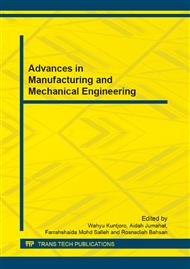p.959
p.965
p.971
p.976
p.982
p.988
p.993
p.999
p.1005
A Study on Effect of Intelligent Speed Adaptation (ISA) to Bus Drivers
Abstract:
ntelligent Speed Adaptation (ISA) is a system that constantly monitors vehicle speed, local speed limit on a road and implements an action such as giving warning or discourages the drivers when the vehicle is detected to be exceeding the speed limit. A GPS connected to digital speed map allows Intelligent Speed Adaptation technology to continuously update the vehicle speed limit to the road speed limit. The main purpose of this project is to study the speed profile and effect on drivers psychology on Intelligent Speed Adaptation to bus drivers before and after the intervention of ISA technology. An experiment was conducted on GPS-ISA instrument involving about 20 respondents of Universiti Teknologi MARA (UiTM) Shah Alam Campus bus drivers from various backgrounds. The instrument used to collect data is GPS-ISA device. The data gained from GPS-ISA device is speed profile to specify the speeding and speed variation. To evaluate drivers psychology, a set of questionnaire was designed. The data gained from questionnaire are attention level, stress level, and ISA acceptance level. The result of total differences for all 20 respondents between the average speed before and after the intervention for Zone 1 to Zone 5 was-8.95 km/h. For drivers psychology results, most of the respondents are willing to use ISA system if given a chance. Majority of respondents did not felt any stress and distraction while driving by using ISA system. For conclusion, the ISA system proved to be efficiently reduced speed of busses in UiTM Shah Alam campus zone and can be used as an initiative in order to assist bus drivers to reduce speed of vehicles especially in campus zone.
Info:
Periodical:
Pages:
982-987
DOI:
Citation:
Online since:
September 2013
Keywords:
Price:
Сopyright:
© 2013 Trans Tech Publications Ltd. All Rights Reserved
Share:
Citation:


